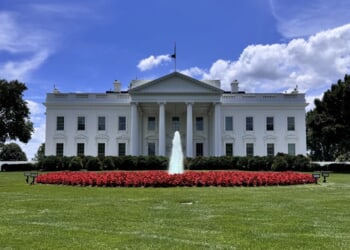President Trump’s nominee for Secretary of the Air Force deserves scrutiny for his close ties to Elon Musk—one of the Pentagon’s largest contractors.
As a former senior Department of Defense official who has spent decades safeguarding America’s national security interests, I am deeply troubled by recent developments surrounding President Donald Trump’s nomination of Troy E. Meink to be the next Air Force Secretary.
As politicians, opinion leaders, and the American public debate the impact and savings of Elon Musk’s Department of Government Efficiency (DOGE), what is more troubling is the apparent influence the SpaceX and Tesla CEO may have over defense policy, including Meink’s nomination.
It is notable that Musk reportedly recommended Meink for the job. This shouldn’t come as a surprise. Seven insiders recently told Reuters that an inspector general investigated Meink to see if he changed the terms for a classified $1.8 billion contract to favor SpaceX—a contract that Musk’s company ultimately won.
Meink may well be the best person for the job. The U.S. Senate must exercise its advice and consent powers to debate and determine that during the confirmation process. However, it would be deeply troubling if he was nominated for the position simply because Musk pushed for this outcome, as it raises questions of bias and impropriety with companies that do billions of dollars’ worth of business with the government and the Air Force specifically.
Civilian control over the military is one of America’s proudest and most unique traditions. Today, however, the United States faces a situation where potential influence comes from an individual who works significantly with China. Some defense leaders have outlined concerns that Musk’s companies could be subjected to the country’s military-civil fusion laws, in which their intelligence must be shared with the Chinese Communist Party. Senators Elizabeth Warren (D-MA) and Tammy Duckworth (D-IL) of the Senate Armed Services Committee have already raised concerns about Meink’s potential favoritism toward Musk and SpaceX, emphasizing that he would be responsible for “key contracting, deployment, and acquisition decisions” in areas where Musk’s companies currently dominate.
The senators are right. This isn’t about partisan politics, but protecting America’s national security.
SpaceX already has approximately $22 billion in current government contracts. Its defense contracts more than doubled from 2023 to 2024, increasing from $856 million to $1.8 billion. On the face of it, there is no reason to suspect that these contracts were awarded unfairly. But the recent reports about potential impropriety between Musk and Meink are certainly enough to make one ask questions.
The Air Force Secretary must navigate complex relationships with defense contractors while maintaining absolute independence from political pressure. Even the appearance of impropriety can taint a specific program and the entire agency or department. And any perception that this position has been influenced by commercial interests undermines public trust and military effectiveness.
This isn’t about questioning Mr. Musk’s patriotism, or his companies’ contributions to American innovation. It’s about ensuring the best possible outcome for America’s national security.
The Senate must thoroughly examine this nomination for any potential conflicts of interest. Our government and military leaders must act objectively, without any hint of bias or favoritism. It is illogical for DOGE to advocate for greater transparency and accountability regarding Pentagon contracts and programs, but also to leave people wondering whether the head of the Air Force was handpicked by an individual who could then profit from his contracting choices.
Let the digging begin. The American people deserve no less.
Steve Diminuco is a former Deputy Director for Global Intergovernmental Affairs and Senior Conferences Coordinator at the U.S. Department of State.
Image: Shutterstock.
















